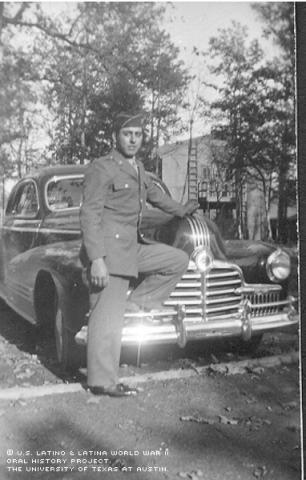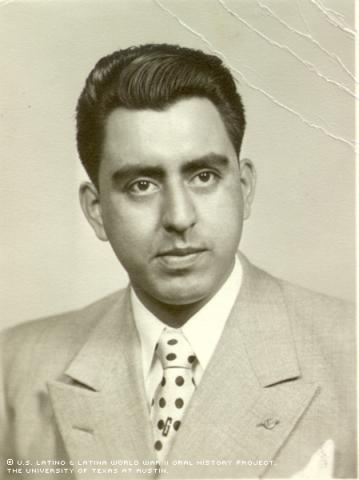

By Ginny Snyder
Surrounded by news of the war in Europe, and with most of his friends already called to duty, Gabriel Valades enlisted in the Army in March of 1943 despite his parents’ concern. Even though his arrival came in the war's last days, Valades managed to witness the destruction and devastation of World War II firsthand.
"My memories of this trip," he said, "were of sadness and devastation." The people begged for food and cigarettes, elderly people and young children roamed the streets, and their homes and towns were virtually destroyed.
After a 10-day trip through rough Atlantic seas, on which he was very seasick, Valades and the other infantrymen landed in Marseille, France, in the spring of 1945. They were given M-1 rifles, loaded into "40 and 8" box cars and shipped to Germany to relieve troops. Afterward, they traveled to the Austrian border. This was a gloomy time for Valades, as he had plenty of time to recall the destruction he’d encountered.
When they crossed the border into Germany, people appeared to be better fed than the French, and like the French, they seemed pleased at the arrival of American GI's; however, their homes and cities were also in ruins.
"The American and British bombers sure did a complete job in bombing Deutschland," recalled Valdes, remembering hearing people cry out, "Alles Caput," meaning everything is destroyed.
He then went on to Stuttgardt, Germany, where his troops guarded railroad yards and passing trains.
"The trains were full of people going nowhere," he said:
Though the Germans and people of other nationalities were now free to go, they no longer had homes to return to. One day, Valades recalled, a baby was born on a train, but died shortly thereafter and was left in rags alongside the tracks.
Something even more horrific Valades witnessed: He was on duty when bodies from concentration camps near Munich were passing through.
"It was a horrible sight, and the stench was beyond words," he said, wondering how it was possible for any human being to treat another in such a despicable manner.
Prior to his service overseas, Valades was sent to Camp Crook, Neb., where he was issued clothing and gear and promptly shipped to Camp Butner in North Carolina to complete basic training. As part of the 78th Lightning Division, Valades and company were teamed up with the 303 Combat Engineers Battalion and assembled bridges day and night. The Bailey Bridge, a common pre-fabricated steel panel span still in use today, had to be put up and taken down several times a night to prepare the troops for moving military equipment across waterways. In addition, they learned about land mines and booby traps intended to blow them up.
Valades said he didn’t encounter discrimination during his military service, though he trained with white troops. Instead, he found them friendly and courteous. In addition, he said the black people in North Carolina "thought I was a Greek or Italian and treated me kindly." These were people he met on the bus, when going on pass to Durham, N.C., he said.
Upon landing in Marsielle, Valades met a group of former Spanish troops who served in the Spanish Civil War, who’d been run out of their homeland when Franco took over. Since he spoke their native tongue, they visited awhile and he gave them much-coveted cigarettes as a parting gift.
After serving in the war and witnessing one of the most horrible atrocities committed against mankind in recent history, Valades said he believes WWII was a necessary fight; however, because of the millions upon millions of wasted lives and dollars, he insists, "nobody won anything."
Valades returned stateside in April of 1946 and enrolled in the Chadron State Teachers College in Chadron, Neb., graduating with a Bachelor of Science degree in 1953. He taught in Glendo, Wyo., for three years and returned to school in Greeley, Colo., to do graduate work. He worked as a rehabilitation therapist for 29 years in Fort Meade and retired in 1985.
Since retirement, Valades has been an active volunteer with the Knights of Columbus; he’s also the chaplain of the VFW Post 2730 and an officer in the Disabled American Veterans Chapter 11 in Sturgis.
He and his wife, Helen Cordova Valdes, have been married 50 years and have seven children and four grandchildren. Their oldest, Gabriel Jr., a railroad brakeman, died in a train accident in 1981. Valdes lives close to his brothers and sees them regularly.
"Helen still works two days a week in a restaurant in Sturgis and I try to keep busy and out of trouble around the house," he said in a note to the Project after his interview. "But also, I got to town a lot to have coffee -- con mis amigos (with my friends)!!"
Mr. Valdes was interviewed on October 27, 2000, by Rea Ann Trotter.

